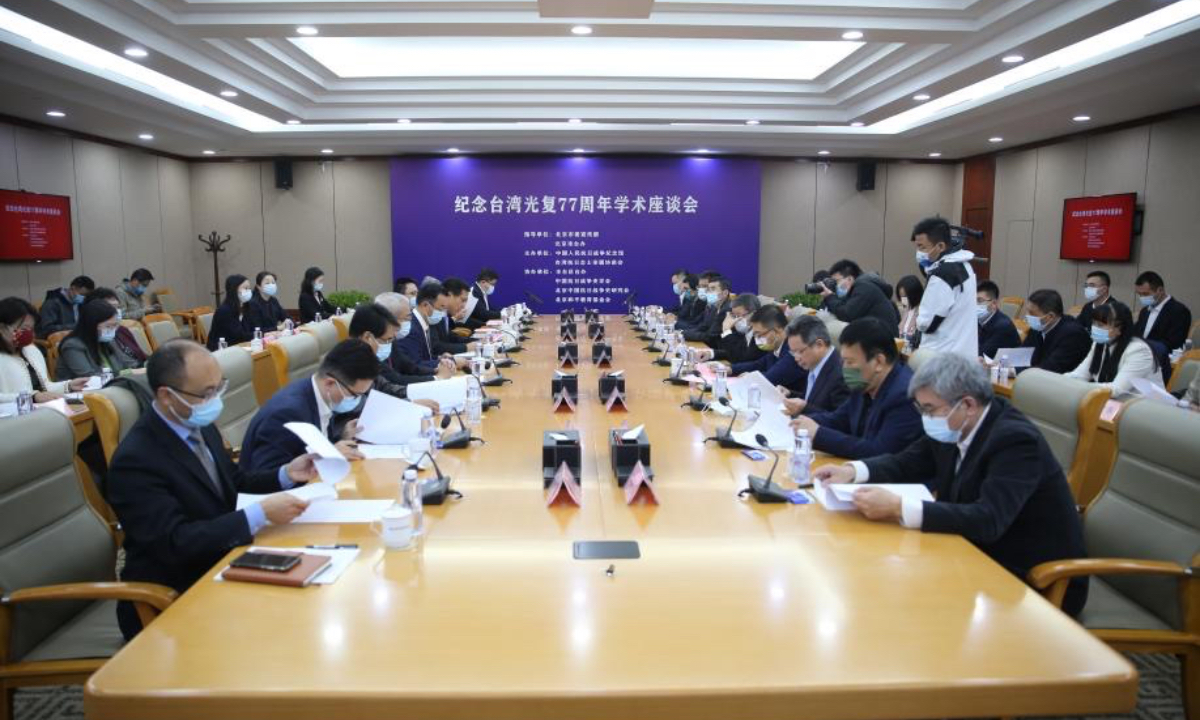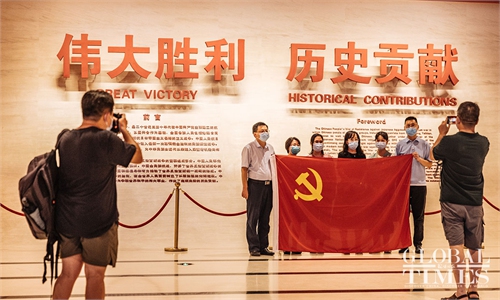Officials, scholars express full confidence in reunification as Beijing marks 77th anniversary of recovery of Taiwan from Japanese occupation

A symposium was held to commemorate the 77th anniversary of the recovery of Taiwan from Japanese occupation and the 30th anniversary of the 1992 Consensus at the Museum of the War of Chinese People's Resistance Against Japanese Aggression on October 25, 2022. Photo: Courtesy of the museum
Officials, scholars and representatives from across the Taiwan Straits expressed firm defense of the one-China principle and full confidence in realizing national reunification and rejuvenation at a Tuesday symposium held to commemorate the 77th anniversary of the recovery of Taiwan from Japanese occupation.
"Taiwan's restoration was the result of the common fight against Japanese occupation of people across the Taiwan Straits. It showed that Taiwan people have the tradition of patriotism and that the island's prospects and its people's well-being lie in national reunification,"Yang Yizhou, the deputy head of the All-China Federation of Taiwan Compatriots, said at the symposium, which was held at the Museum of the War of Chinese People's Resistance Against Japanese Aggression.
The true meaning of commemorating the island's recovery from Japanese occupation is to prove to the world that Taiwan's territorial sovereignty belongs to China and people in the region are Chinese people, Yang said.
October 25, 1945 marked the end of Japanese occupation of Taiwan, which had started in 1895 when the Qing government was defeated by Japanese aggressors and was forced to cede Taiwan and the Penghu Islands to Japan.
On that day, the Chinese government announced that it was resuming the exercise of sovereignty over Taiwan, and the ceremony to accept Japan's surrender in Taiwan Province of the China war theater of the Allied powers was held in Taipei. From that point forward, China had recovered Taiwan de jure and de facto, as recognized by a host of documents with international legal effect.
Curator Luo Cunkang said the museum has held a series of exhibitions on how people in Taiwan fought against Japanese aggressors. Several batches of staff were sent to Taiwan to collect first-hand historical materials for these exhibitions, Luo noted.
"The museum will tell the story of how people across the Straits fought against Japanese aggression to deepen the historic memory and enhance their national, ethnic and cultural identity," Luo added.
Scholars discussed the 1992 Consensus' historical merits and the importance of adhering to it at the symposium, as 2022 also marks the 30th anniversary of the 1992 Consensus, of which the core is that the Chinese mainland and Taiwan belong to one China.
Reached between the mainland's Association for Relations Across the Taiwan Straits and the Taiwan's Straits Exchange Foundation in 1992, the 1992 Consensus has become the political foundation for peaceful exchanges and pragmatic cooperation between the two sides.
The 1992 Consensus made very clear the fundamental nature of the cross-Straits relations, which is that even though the mainland and the island haven't been reunified, both of them belong to one China and China's sovereignty and territorial integrity have never been split, said Mu Xuefeng, head of the publicity department of the Taiwan Democratic Self-Government League.
Both sides of the Taiwan Straits belong to the same country and Taiwan is part of China. This historical fact and the legal basis have never changed and will never change, Mu added.
Xia Lu, a research fellow from the Taiwan, Hong Kong and Macao Research Center under Renmin University of China, said that the 1992 Consensus contained the consciousness of a community of a shared future for the Chinese nation.
The one China, which the mainland and Taiwan belong to, is a modern state which is made up of the whole Chinese nation and is the base of its future great rejuvenation, Xia said.
Experts also warned of Taiwan's secessionist Democratic Progressive Party (DPP) authorities' denial and distortion of the 1992 Consensus, saying the DPP will come to an end as the wheels of history are rolling on toward China's reunification and the rejuvenation of the Chinese nation.
"Resolving the Taiwan question is a matter for the Chinese, a matter that must be resolved by the Chinese," read the report delivered at the opening session of the 20th National Congress of the Communist Party of China on October 16. "Complete reunification of our country must be realized, and it can, without doubt, be realized," it said.
Officials from the Taiwan Affairs Office of the State Council, the Taiwan Affairs Office of Beijing Municipal People's Government, and the Publicity Department of the Communist Party of China's Beijing Municipal Committee emphasized the importance of communications across the Straits and called on Taiwan compatriots to reject secessionist forces and work toward national reunification and rejuvenation.
Some Taiwan compatriots who work and live in Beijing talked about the dramatic changes they have witnessed in the mainland, expressing determination to make their contribution to promoting exchanges across the Straits and their full confidence in China's reunification and rejuvenation in the future.


